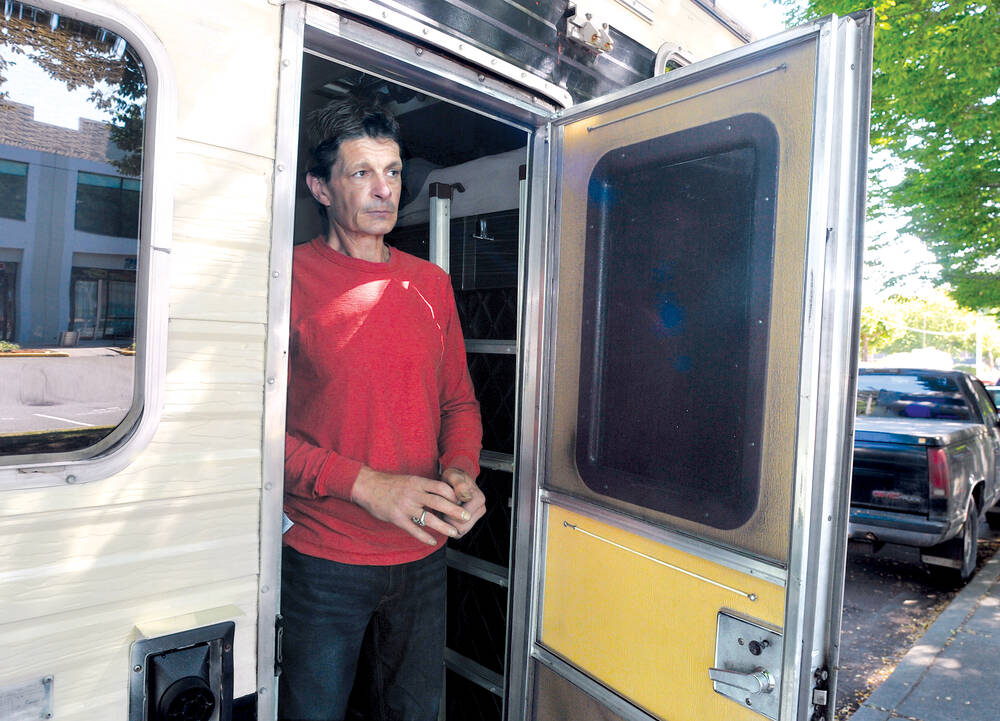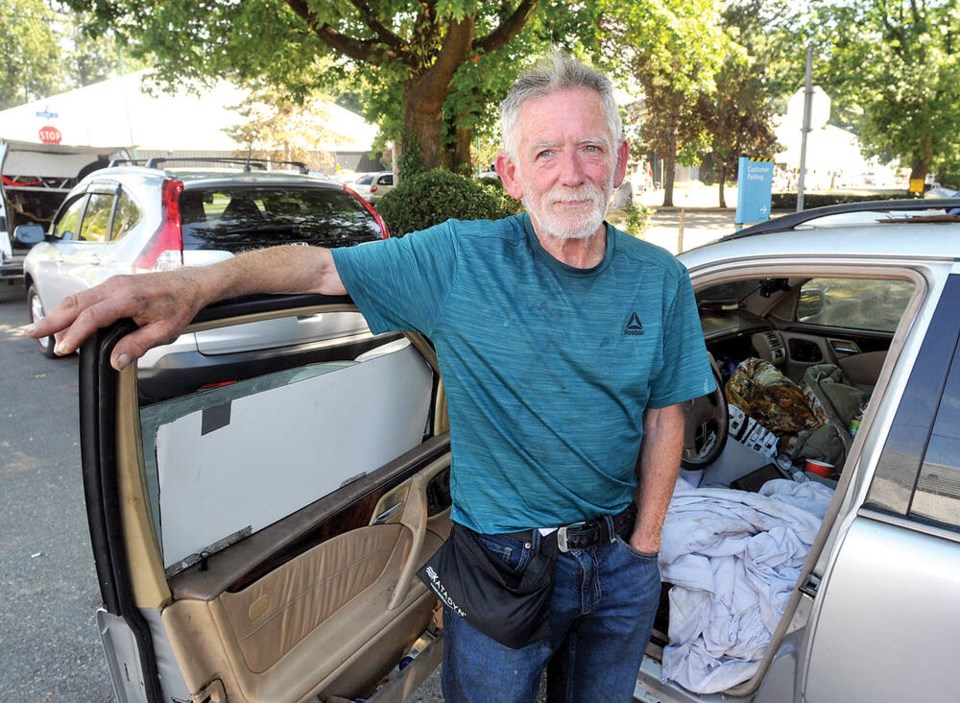The number of people found sleeping rough on the North Shore has climbed 67 per cent in the last two years, according to the latest Point-in-Time Homeless Count.
Every two years, volunteers fan out across the community to survey people staying in shelters, encampments and vehicles to better understand changes in the region’s homeless population.
On the North Shore, volunteers met with 85 unsheltered individuals in 2025, up from 51 in 2023.
The number of folks staying in shelters, safe houses, hospitals or jail at the time of the March 11 count, fell from 117 in 2023 to 83 this year.
It means the total number of homeless people stayed static, but more of them were sleeping outside.
That is a serious problem, said Mark Friesen, executive director of Hollyburn Community Services Society, which operates safe houses for seniors and youth facing homelessness.
“It’s more people out on the streets who are increasingly precarious. They’re not safe and it’s going to result in lives lost,” he said.
Organizers of the survey always stress that the numbers are known to be under-counts because individuals experiencing homelessness must agree to participate in the survey in order to be reflected in the numbers.
Friesen said the actual numbers are likely between 400 and 600 individuals on the North Shore who experienced homelessness at one point or another in the last year. In 2024, Hollyburn’s homelessness outreach team supported 322 individuals or families, 60 of which they were able to get into permanent housing. Another 74 young people came to Hollyburn’s youth safe house.
Friesen said they are seeing more clients who are experiencing homelessness for first time, “which is a change.”
There are numerous reasons a person may end up without shelter, but increasingly, Friesen said, it follows an apartment fire that has displaced an entire building of residents.
“They’re left to go to the market, and the market doesn’t have a lot of options,” he said. “There tends to be fire every year on the North Shore.”
Others have mental health or substance use issues that local non-profits aren’t equipped to resolve on their own, and the waitlists for psychiatric crisis care are “huge,” he said.
“And so their recourse is to go on the street,” he said, adding that once that happens, it’s much more difficult to get them back on track. “It’s going to take longer, and the chances decrease.… It’s just going to be more expensive because at that point in their trajectory, they need way more support than they might have if prevention could have happened earlier.”
The current provincial and federal governments have tailored their housing policies to getting more supply into the market, but Friesen said it is non-market housing that is most needed to address homelessness.
“On the North Shore, the answer for us would be more support for emergency shelters and second stage or supportive housing,” he said.

Cracking down on RV Dwellers
The release of the numbers comes as the District of North Vancouver has been clamping down on people parking RVs on the street for long periods of time, particularly around Lloyd Avenue.
That’s where 70-year-old Dana Mathers is currently staying in an older Mercedes sedan shared with his younger brother. They had been living in their family’s home in Horseshoe Bay, but it was destroyed in a fire two years ago.
“It’s horrible, actually. I am so sick of this. It’s unbelievable. You want to [change your clothes], you’ve got your feet strapped around the steering wheel. It’s no fun,” he said. “I’ve got to get out of here as fast as I can.”
Some of his neighbours in vans and vehicles could be in apartments if they wanted to be, he said. After 14 months of getting shunted around the North Shore, Mathers said he is planning to return to Horseshoe Bay in his car. Asking or forcing everyone to move on won’t solve anything, he added.
“What do you do with these people?” he said. “It wouldn’t do them any good. I don’t think anybody would come and save them anyways.”
District of North Vancouver Coun. Catherine Pope helped connect Mathers to BC Housing, but Mathers said he’s found it difficult getting help.
“Affordable housing would be unbelievable, but I don’t know if you can just pick out people like me for that,” he said. “For the whole area, the housing, I think, is ridiculous.”
At a July 21 council debate about the RV dwellers and parking on Lloyd Avenue, Pope stressed to council that a year had gone by since they voted unanimously on a motion of hers to seek out sites that could be made into transitional housing in the short term.
“And yet we still have nothing. No plan, no sites, nothing. This council has given lip service to wanting to help people in need, but in reality, we have not made it happen,” she said.
Pope sought to amend a motion on the table directing the municipality “to collaborate with the federal and provincial housing ministries to secure funding for transitional housing and people living in vehicles … and identify DNV lands not previously considered.”
Pope’s amendment failed to pass though, with Couns. Herman Mah, Lisa Muri, Betty Forbes and Mayor Mike Little opposed, largely on the grounds that they had no reason to believe more federal or provincial support would come.
“We’ve been talking about this over and over and over again, and we just keep sending motions and hoping that somehow it’s going to miraculously solve all these problems,” Muri said. “Let’s just say it as it is. If it makes us feel better to pass a motion to say, ‘Let’s phone the province and the feds,’ well, OK, but we’ve phoned them. They have no money. Like, why do we keep doing this?”
Friesen said he understands a lot of requests for affordable housing grants are going unanswered, but he said there other models that could be tried, including using private or non-profit land to create temporary, safe transitional housing villages.
Between 2023 and 2025, the number of people captured by Point-in-Time Homeless Count across the greater Vancouver region rose nine per cent, to a record 5,243. Since 2005 – the first year the count was conducted – the number has climbed 141 per cent, according to the report, while the region’s population grew by 44 per cent.
At 34 per cent, Indigenous people continue to be disproportionately overrepresented, something attributable to the lasting impacts of colonization, residential schools and the child welfare system in B.C.
From the steps of his RV, a 40-year-old Ford Chateau, Shawn Okell said he had been staying at the North Shore shelter for a while but wanted to be able to have his partner stay with him. He bought the broken-down RV for $1,500, got it running again and for the last four months, he’s been parked on Third Street near Mackay Creek.
The 54-year-old worked his whole life “pulling wrench” as an auto mechanic, but the chronic pain from a long-ago motor vehicle collision made that impossible keep it up. He and his ex owned a home, which he lost in the divorce.
At first, living in an RV without electricity was “hell,” he said, and he did get dinged by bylaw officers for using a generator on the street. But Okell is proud of how he’s brought the “ancient” RV into immaculate shape, from the engine compartment to the rear bumper. He said he and his partner are planning to drive the RV to Vancouver Island soon.
“We have hit rock bottom twice before, real bad, and I clawed my way out,” he said. “So why can’t I do this again?”
Want to stay updated on North Vancouver and West Vancouver news? Sign up for our free daily newsletter.




